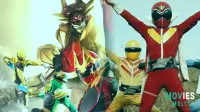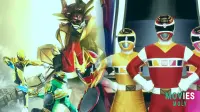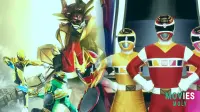Hold onto your helmets, Sentai fans! After five decades of saving the world, reports are swirling that the legendary Super Sentai Series might be concluding its epic run with No. 1 Sentai Gozyuger. But is this really the end, or just a new beginning?
TL;DR: The Quick Scoop on Super Sentai's Future- Kyodo News reports the iconic Super Sentai Series is ending after 50 years on TV-Asahi, with No. 1 Sentai Gozyuger as its final installment, concluding in 2026.
- The alleged reason for cancellation is that merchandise and event profits haven't covered production costs, leading to financial concerns.
- While official statements from Toei and TV-Asahi are still pending, producer comments hint at a "next stage" for the franchise, leaving many hopeful for a rebrand rather than a complete end.
A Shocking Announcement: Super Sentai's Historic Broadcast Run Reportedly Concludes

Get ready for some potentially heartbreaking news, tokusatsu enthusiasts. This past Thursday, the Kyodo News agency dropped a bombshell, reporting that the beloved Super Sentai Series, currently celebrating its 50th anniversary, is set to wrap up its broadcast run on TV-Asahi. After half a century of thrilling heroics and giant robot battles, the current series, No. 1 Sentai Gozyuger, which premiered in February, is reportedly slated to be the grand finale.
The news, also picked up by outlets like Sankei Shimbun, cites sources familiar with the production, suggesting that profits from merchandise, live events, and movie adaptations just haven't been enough to keep up with the rising costs of producing the show. It’s a tough pill to swallow for a franchise that has been a staple of Japanese television for generations.
However, here’s where things get a little hazy: as of writing, neither TV-Asahi nor Toei (the production studio behind Sentai) have made any official statements to confirm or deny these reports. Even cast members and voice actors, like Yuki Kaji (Tegasword), have stated they haven't received official notice. This silence has fueled a lot of speculation and a mix of sadness, frustration, and a sliver of hope among the dedicated fanbase.
Tracing Five Decades of Heroes: The Storied History of Super Sentai on Television

For those unfamiliar, Super Sentai isn’t just any superhero show; it’s a cultural cornerstone. The series first exploded onto screens in 1975 with Himitsu Sentai Gorenger, featuring five color-coded heroes battling evil. It was the brainchild of the legendary manga artist Shotaro Ishinomori, who also gave us iconic franchises like Kamen Rider and Cyborg 009.
Since its inception, Super Sentai has been a nearly continuous force, only skipping one year – 1978. That year, Toei partnered with Marvel Comics to produce their unique take on Spider-Man, which famously introduced a giant robot, Leopardon. The success of Leopardon inspired a game-changing addition to Super Sentai: giant robots made their debut in 1979’s Battle Fever J, becoming an indispensable part of the series' formula ever since.
Every year since 1979, a new team of heroes has taken up the mantle, each with unique themes, powers, and, of course, a new line of awesome mecha and collectibles. This constant reinvention, coupled with its consistent format of martial arts, swordfights, and climactic robot battles, has kept the franchise fresh and engaging for half a century. It's truly an incredible legacy that few shows can boast.
More Than Just Entertainment: Super Sentai's Enduring Cultural Impact

Beyond its thrilling action and vibrant characters, Super Sentai has played a significant role in Japanese popular culture. It's served as a crucial stepping stone for many young actors, launching careers that have gone on to superstardom. Think of award-winning actors like Tori Matsuzaka (Samurai Sentai Shinkenger), Yuki Yamada (Kaizoku Sentai Gokaiger), and Ryusei Yokohama (Ressha Sentai Toqger) – they all got their start fighting villains in colorful spandex.
The show's simple yet effective formula – typically a team of five (three men, two women) led by a red-suited hero, each with distinct color coding and a giant robot to call upon – resonated deeply with audiences. It taught lessons of teamwork, courage, and perseverance, making it much more than just a weekly broadcast; it was an advertisement for dreams, inspiring countless children and adults alike.
Fans online are expressing deep sadness and nostalgia at the prospect of its ending. Popular actress Keiko Kitagawa simply posted "despair" on X, while actor Yasuhisa Furuhara (Engine Sentai Go-onger) shared his pride in being part of such a long-standing history. Voice actor Tetsu Inada (Tokusou Sentai Dekaranger) also expressed his honor and the dreams he still harbored for the series, highlighting its profound impact on those who worked on it and those who watched.
The Power Rangers Pipeline: What Super Sentai's Conclusion Means for Western Fans

For many international fans, especially in the West, Super Sentai is most famously known as the source material for the globally successful Power Rangers franchise. Starting with 1993’s Mighty Morphin Power Rangers, which adapted footage from 1992’s Kyōryū Sentai Zyuranger, the Japanese series provided the iconic suit designs, monster suits, mecha concepts, and a significant portion of the action sequences for decades.
However, the relationship between the two franchises has been evolving. In recent years, Hasbro, the current owner of Power Rangers, has begun to move away from relying on Super Sentai footage. Power Rangers Cosmic Fury (2023) was the first season to feature entirely new costume designs not originating from a Sentai series. Furthermore, 2024 marked the first year since Mighty Morphin’ Power Rangers premiered that there were no new Power Rangers episodes, with a full reboot of the franchise reportedly in the works at Disney+.
If Super Sentai truly ends, it means any future live-action Power Rangers productions will have to be completely original, which could significantly drive up production costs. It signals a complete divergence between the two long-related properties, pushing Power Rangers to carve out an entirely new identity without its Japanese progenitor.
Behind the Curtain: Production Costs and the Evolving Media Landscape

The core reason cited for Super Sentai's alleged end boils down to economics. Producing a weekly tokusatsu series with new suit designs, elaborate action sequences, and giant robot battles is incredibly expensive. While the franchise has always been supported by robust merchandise sales and tie-in events, reports indicate these revenues are no longer enough to offset the high production costs.
This situation isn't unique to Super Sentai. The broader media landscape, especially the rise of streaming, has drastically impacted traditional TV ratings. Competing with an ever-expanding array of content for children's attention has become increasingly challenging. Interestingly, a rival franchise, Kamen Rider (also created by Ishinomori), seems to be navigating these waters with more success. Kamen Rider, while older and often targeting a slightly older demographic, has recently seen global expansion, with its latest series, Kamen Rider Zeztz, being simulcast in the U.S. for the first time.
This comparison suggests that while the tokusatsu genre remains popular, the traditional Super Sentai model might be struggling to adapt to modern economic and viewership trends. The need for a "next stage," as hinted by a producer, feels more urgent than ever.
"I think Gozyuger is a program that retells the history of Super Sentai, including redefining the warriors of the past. That’s why the 51st series can’t just be an extension of that. I believe the program itself has to move on to the next stage… and we’re currently in the midst of building it!"
— Shinichirō Shirakura, Super Sentai Series Producer (via Daily Sports Online) Is This Truly the End, or Just a New Beginning Through Rebranding?
Despite the dire reports, a significant portion of the fandom and even some industry insiders are holding onto hope that this isn't a definitive end, but rather a "soft reboot" or a rebranding of the franchise. Producer Shinichirō Shirakura’s comments earlier this year about Gozyuger redefining past warriors and the need for the series to move to a "next stage" certainly lend weight to this theory. He even explicitly stated that a new program was "currently in the midst of building."
The timing is also interesting. Historically, the title for the next Super Sentai series usually emerges around November through trademark filings in Japan. The absence of such a filing, coupled with these reports, could indicate a deliberate pause or a significant shift in branding. It’s plausible that Toei might be looking to launch a similar hero team show under a new name or format to address the financial issues and media challenges, while still keeping the spirit of Sentai alive.
Such a move wouldn't be unprecedented in the entertainment world, allowing the franchise to shed old baggage, innovate its storytelling, and potentially open up new avenues for global marketing, much like Kamen Rider has recently achieved. For fans, this offers a beacon of hope that their beloved series isn't disappearing forever, but merely transforming.
The Future of Tokusatsu: What Lies Ahead for Japanese Superhero ProductionsThe potential conclusion of Super Sentai as we know it has broader implications for the tokusatsu genre as a whole. While Kamen Rider continues to thrive with global simulcasts and expanded media (like the Tojima Wants to Be a Kamen Rider anime), the challenges faced by Sentai could highlight a need for innovation across the board.
Toei, a powerhouse in tokusatsu, will undoubtedly continue to produce superhero content. Whether this comes in the form of a completely new brand, a revamped Sentai under a different title, or increased focus on their other successful properties like Kamen Rider, the future will certainly be watched closely by fans around the globe. The core appeal of brightly colored heroes, incredible action, and giant robot battles remains strong, suggesting that while the name might change, the essence of tokusatsu will likely endure.
Fan Reactions and the Bittersweet Reality: A Community Mourning and HopingThe news has undoubtedly sent shockwaves through the fan community, both in Japan and internationally. Social media platforms are filled with expressions of sadness, disbelief, and gratitude for the memories created over five decades. For many, Super Sentai was a childhood companion, a rite of passage, or even a pathway into Japanese culture.
Yuma Nishi, a member of the idol group NMB48, perfectly captured the sentiment, writing on X, "Wait a minute, my whole life... Even if I wake up in the morning, the Super Sentai series is really ending?" This raw emotion underscores the deep connection fans have with the series. While the uncertainty lingers, the outpouring of love and appreciation is a testament to the powerful legacy Super Sentai has built.
As No. 1 Sentai Gozyuger continues its run towards its reported 2026 finale, all eyes will be on Toei and TV-Asahi for any official word. Until then, fans will continue to celebrate the past, cherish the present, and eagerly await what the future holds for the incredible world of Super Sentai.
Frequently Asked Questions About Super Sentai's Reported End When is the Super Sentai Series reportedly ending? Reports indicate the series will conclude with No. 1 Sentai Gozyuger, which is expected to finish its broadcast run in 2026. What is the main reason cited for Super Sentai ending? Kyodo News and other outlets report that insufficient revenue from merchandise, events, and film adaptations, compared to high production costs, is the primary reason for the decision. Has Toei or TV-Asahi officially confirmed the end of Super Sentai? As of now, neither Toei nor TV-Asahi have made official public statements confirming the end of the series. TV-Asahi has declined to comment on "future programming." Could Super Sentai return as a new series or with a different name? There's significant speculation, supported by past producer comments, that the franchise might undergo a "soft reboot" or rebrand under a new name to adapt to modern challenges, rather than ending entirely. Fans are hopeful for such a transition. Sources- Kyodo News via Oricon News and Anime News Network
- BBC News
- io9 / Gizmodo
- ScreenRant
- CBR
- Bounding Into Comics
- Tokyo Weekender
- CNA (Channel News Asia)
- MeriStation USA






